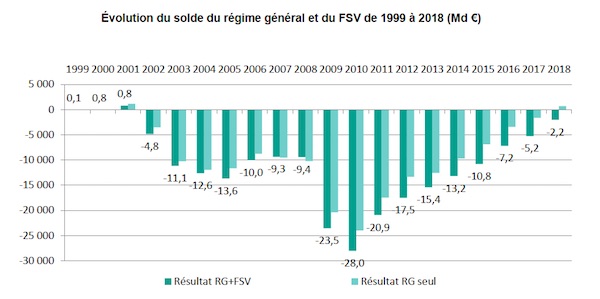The government estimates that the social security deficit will reach 2.2 billion euros next year, the lowest level since 2010.

The goal is ambitious and will require belt-tightening. The government plans to reduce the Social Security deficit by 3 billion euros for 2018. It would thus stand at 2.2 billion against 5.2 billion euros for 2017, i.e. “the highest level weak since 2001”, raised the Minister of Solidarity and Health during the presentation of the social security financing bill (PLFSS 2018) this Thursday, September 28 alongside Gérald Darmanin, Minister of Action and Public Accounts.
The efforts will mainly affect the health branch with the objective of reducing the deficit from -4.1 billion euros in 2017 to -800 million in 2018.
The old age branch will also be put to contribution (from 1.3 billion to 200 million in one). “We are clearly on a trajectory to return to balance in 2020,” said the Minister of Health.

Source: Evolution of the deficit of the General Scheme (RG) and the Old Age Solidarity Fund (FSV), press kit PLFSS 2018
Savings on drugs
To achieve this, the government is counting on saving more than 4 billion euros. The drugs and medical devices item will be the most affected with nearly 1.5 billion euros in savings expected. “We generally consume too many drugs, but not enough generics. Efforts will therefore be necessary to reach our European neighbours,” explained Agnès Buzyn. Drug prices will be reduced, promoted generics and certain specialties whose benefits are deemed insufficient will be dereimbursed.
To fill the “safety hole”, new recipes have also been found. The increase of 2 euros in the hospital package on 1er January 2018 should bring health establishments more than 200 million euros in 2018. A sum entirely covered by mutual insurance companies.
“Today, 95% of French people have subscribed to a mutual insurance contract that covers this package,” said the minister, ensuring that these organizations are able to absorb this increase without increasing the contract prices. “With the aging of the population, there are more patients with long-term illness covered 100% by Health Insurance, which generates margins for mutuals”, she described.
Tobacco taxation that pays off
Tobacco taxation is also a significant source of revenue. As expected, the PLFSS 2018 will aim to increase the price of a pack of cigarettes throughout the five-year period. From March 2018, 6 increases (one of 1 euro then 50 cents) will lead to a package at 10 euros.

Thus, in accordance with Emmanuel Macron’s commitments, the National Health Insurance Spending Objective (Ondam), which is used to steer the accounts, will increase by 2.3% compared to 2017. So next year, it should increase by more than 4 billion to reach more than 195 billion euros. More than 45% of this Ondam will be devoted to city medicine, a sign that the government wishes to accelerate the ambulatory shift but also to promote prevention.
.
















